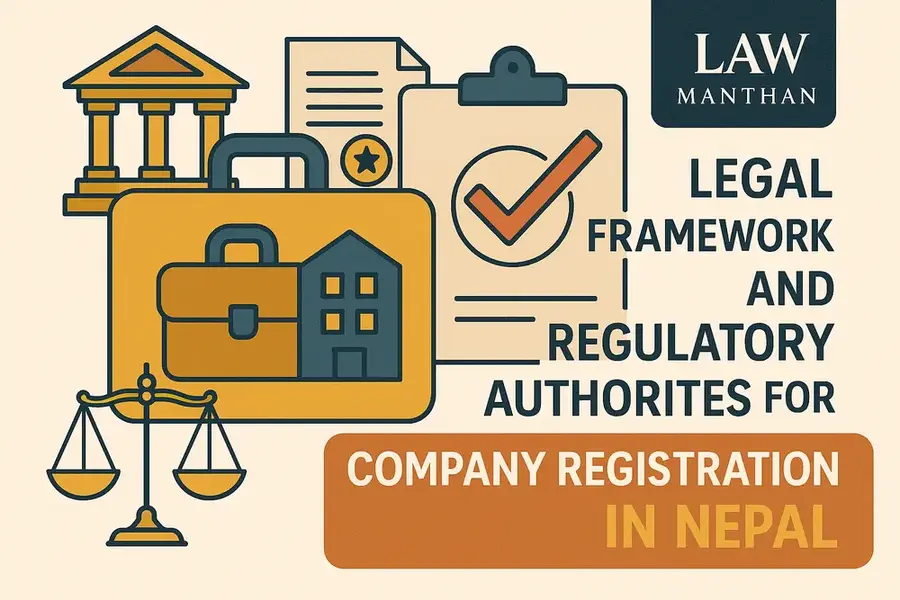Introduction to Company Registration in Nepal
A company is a business entity established under the law that is recognized to carry out specific commercial, industrial, or professional activities. A company operates individually or in collaboration with other individuals or groups for defined legal purposes. Company registration is the process of legal establishment of a company as an entity. The company needs to submit different documents, pay fees charged and wait for approval from the relevant government authority or regulatory body to complete the legal process.
The Companies Registration Step in Nepal is governed under the Companies Act, 2006, and comes under the supervision of the Office of the Company Registrar (OCR). OCR is a government authority operating under the Ministry of Industry, Commerce, and Supplies. Major documents include the Memorandum of Association (MOA) and Articles of Association (AOA) along proof of identity and address details of the company entrepreneur. After fulfilling all legal requirements, the OCR grants a Certificate of Incorporation, officially recognizing the company as a legal entity.
The legal recognition gives several advantages to businesses: the ability of the company to operate under its own name, the ability to enter into a contract, and the opportunity to seek a legal remedy. Additionally, it adds credibility to the business, which is a major factor in acquiring finance, partnerships, or investors.
Company registration in Nepal gives it legal identity, thereby separating it from its owners and granting perpetual succession. The company continues to exist despite a change of ownership. A registered company may own separate property, preventing claims from private over its assets. Thus, limited liability safeguards shareholders restricting their liability to their investment. In conclusion, a company has legal capacity to sue and be sued, which allows it to take legal action under its name. These benefits ensure legal security, credibility, and stability for businesses.
Overview of the Companies Act, 2006
The Companies Act, 2006 is the overarching legislation for the formation, registration, and running of companies in Nepal. It provides for the procedure and requirements that an entrepreneur must comply with to form a company legally. Under this Act, companies have to file documents i.e. MOA and AOA to be registered with the OCR. There are several major provisions under this Act:
- Incorporation Process (Section 4): Entrepreneurs must submit an application to the OCR along with the required documents.
- Company Name Approval (Section 7): The OCR ensures that the proposed company name is unique and reflects the nature of the business, preventing duplication and trademark issues.
- Registration Fees (Section 15): Entrepreneurs must pay a registration fee, which varies based on the type and size of the company.
- Issuance of Certificate of Incorporation (Section 9): Once the registration process is completed, the OCR issues a Certificate of Incorporation, officially recognizing the company as a legal entity.
- Corporate Governance (Section 17): Directors are required to manage the company’s affairs in the best interests of shareholders, maintain accurate records, and comply with governance standards.
- Post-Incorporation Compliance: After incorporation, businesses must comply with various legal requirements, including tax registration (PAN, VAT) and submission of annual returns and financial statements.
- Company Dissolution (Section 74): The Act outlines procedures for voluntary or involuntary dissolution of a company, including debt settlement and asset distribution.
Role of the Office of Company Registrar (OCR)
The Office of the Company Registrar (OCR) is a government entity regulating the company registration process in Nepal. The roles of the OCR include:
1. Regulating Company Registration: The OCR is responsible for processing and approving all applications for company registrations.
2. Company Name Approval: The OCR is responsible for reviewing and approving a company name that conforms to legal considerations.
3. Issuance of Certificate of Incorporation: Upon completion of registration, the OCR issues the Certificate of Incorporation, which essentially conveys legal recognition to the company.
4. Maintaining Company Records: The OCR maintains a register of all companies where the public can access important information about the companies.
5. Compliance Monitoring: The OCR takes care to ensure that companies meet their annual requirements, such as submission of their financial statements and annual returns.
6. Monitoring Corporate Governance: The OCR sees to it that corporate governance requirements are met by companies, including the holding of Annual General Meetings (AGMs) and appointments of auditors.
7. Enforcement of Compliance: The OCR takes enforcement measures against companies failing in legal and regulatory requirements, including fines and possible dissolutions.
8. Public Awareness and Guidance: The OCR creates awareness among businesses regarding legal obligations, corporate governance issues, and best practices on compliance.
Recent Changes in Registration Fees
Recently, the company registration process in Nepal has seen some major changes, especially in terms of fees. In the fiscal year 2080/81, the government introduced a policy that made company registration completely free. However, starting from 1st Shrawan 2081, businesses now have to pay a registration fee, known as rajaswa, which is essentially a tax on the registration process. This change is aimed at balancing support for entrepreneurship while ensuring the government continues to generate necessary revenue.
Online Registration for Convenience
To make the registration process smoother and more accessible, the Office of the Company Registrar (OCR) has introduced an online registration system. Now, entrepreneurs can reserve a company name, draft key documents like the Memorandum of Association (MOA) and Articles of Association (AOA), and complete the entire registration process digitally. This upgrade simplifies the process and saves time, making it easier for businesses to get started.
Steps for Company Registration
The updated registration process follows a few streamlined steps:
- Name Reservation – The first step is reserving a unique company name through the OCR’s online platform.
- Document Preparation – Entrepreneurs must draft the MOA and AOA, which define the company’s objectives and governance structure.
- Company Registration at OCR – Once the documents are ready, they need to be submitted for official approval.
- Tax & Local Ward Registration – After getting registered, businesses must also register for tax (PAN/VAT) and complete local ward registration to begin operations legally.
Conclusion
Company registration processes in Nepal governed by an established legal framework, Companies Act, 2006. The Office of the Company Registration (OCR) plays a vital role in ensuring compliance and business formation. Entrepreneurs can familiarize themselves with these legal procedures and fulfill the requirements for legally starting and operating their company through a transparent, accountable, and regulated environment. By navigating the company registration process, their businesses are seen by the law, which adds credibility and the gains protection under the law. So, for some local and foreign investors, this process is crucial to making operations smooth and avoiding sticky legal issues in Nepal.




